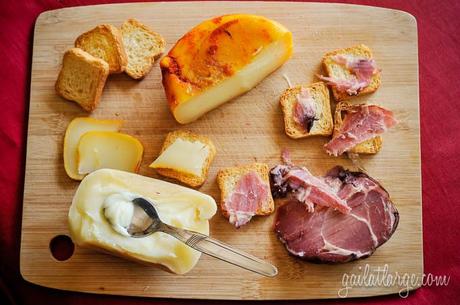
After a weekend in the mountains, I couldn’t return to the coast without some mountain products, especially after Saturday’s al fresco dinner in the presence of a shepherd, his sheep, and his sheep dogs.
There are two sheep cheeses pictured here: the soft, buttery queijo scooped with a spoon and the firmer picante (spicy). Queijo da Serra is a specialty of these mountains with PDO (Protected Designation of Origin) status since 1996. I don’t typically buy presunto (cured ham), but this one is softer and less salty than the average.
I hope you don’t ask me what their specific names are, though, as I sampled my way through the market a bit willy-nilly. There are labels, but since I’m not buying whole items the labels always don’t come with the purchase that’s sliced off, unlike in the supermarkets where an adhesive label with a bar code spits out after the purchase is weighed. This is Old World-style purchasing, usually direct from the producer or maybe a relative who performs vendor duty.
In modern life, it’s easier for working families to choose supermercados (or hipermercados) out of convenience. Thing is, the range of available meats and cheeses in Portugal far outnumber what you’ll find in any supermarket, no matter how big it is. Why? In part, because there are lots of small producers who just can’t compete with the large producers. They don’t make enough product for the export market or to supply a supermarket chain. They’re too small for a marketing budget, let alone a website. Small producers are typically family-run, and families are shrinking in Portugal.
Food that is produced around a small village economy is a labor of love using traditional methods, and many of these traditional methods are dying out. Products like bread, pastries, jams, liqueurs, meats, olive oil, and cheeses are made with machines these days, not hands. The best way to seek out the specialty products is not to rely on the inventory at the local supermarket, but by shipping yourself to the source: make a trip of it and visit towns and villages (not just cities); taste your way through a regional feira (market).
You may find it can also be difficult to bring these goods back to the home country if you’re from outside the EU. Canada, for example, can be very strict about foreign agricultural products, requiring travellers to declare everything and in certain cases, produce certificates for the products.
So what’s a traveler to do? Slow down. Eat locally. Then return for more, of course!
September 12, 2016
Album: Portugal [Summer 2016]

